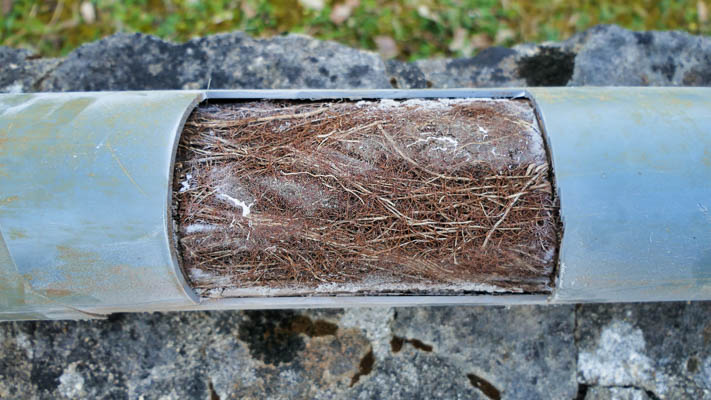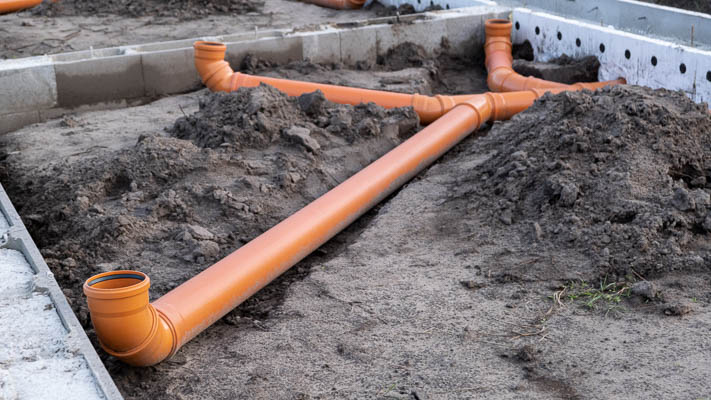Does Homeowners Insurance Cover Underground Pipes?
In most cases, standard homeowners insurance doesn't fully cover damage to underground pipes—especially if the issue developed over time due to wear and tear. However, there are some exceptions.
Generally, insurance will only cover underground pipe damage if it was sudden and accidental, and if the pipes are considered part of the home's main structure. For example, if a tree root suddenly cracks a sewer line and that leads to water backing up into the home, your policy may help pay for the cleanup or related interior damage, but not necessarily the pipe repair itself.
Some insurers offer optional endorsements or add-ons, such as "service line coverage," which is designed to cover damage to pipes that run from the street to your house. This can include water, sewer, and even electrical lines, depending on the policy.
What Causes Damage to Underground Pipes?
Underground pipe systems are vulnerable to a variety of issues that develop out of sight and, too often, without early warning signs. Some of the most common causes include:
- Tree root intrusion: Roots from nearby trees can grow into small cracks in sewer lines or drainpipes, causing blockages or even full breaks over time.
- Soil movement or ground shifting: Expansive clay soils or seismic activity can cause the earth beneath your slab foundation to move, placing pressure on underground pipes and leading to cracks or disconnections.
- Aging materials: Older homes often have outdated plumbing materials like cast iron or clay, which are prone to corrosion, collapse, and joint failure.
- Improper installation: Pipes that weren't laid to code or were installed without adequate slope or support may start to fail prematurely.

Other culprits include freezing and thawing cycles in colder climates, heavy construction nearby, and even chemical corrosion from soil conditions or harsh household cleaners entering the waste line.
Why Won't My Homeowners Insurance Cover Underground Pipes?
Homeowners insurance is primarily designed to protect you against sudden, accidental events—not gradual deterioration or preventable maintenance issues. That's one of the main reasons it typically doesn't cover underground pipe problems.
Here are a few specific reasons your claim might be denied:
- Wear and tear: Damage caused by aging, corrosion, or normal use over time isn't covered under standard policies.
- Neglect or lack of maintenance: If an insurer determines you failed to maintain your plumbing system (e.g. ignoring slow drainage or minor leaks), your claim could be rejected.
- Excluded causes: These are damages caused by common perils that aren't regularly covered under homeowners insurance. Allstate Insurance explicitly excludes damages from things like earth movement, mold, flooding, sinkholes or creature infestations.
It's important to read the fine print of your policy and speak with your insurance agent. Even when damage results in costly repairs, the source of the problem is key when it comes to whether coverage applies.
Preventing Underground Pipe Issues in Slab Foundations
Homes with slab foundations are especially prone to hidden pipe problems. That's because the original plumbing often runs directly underneath the concrete slab—making leaks not only harder to detect, but far more expensive and invasive to fix once they start.
One of the most effective long-term solutions is to repipe the home through the walls, attic, or ceiling instead of the slab. By abandoning the pipes beneath your foundation and rerouting new lines through more accessible parts of the structure, you eliminate the risk of future slab leaks altogether. This approach not only preserves your foundation but also makes future plumbing maintenance easier and more cost-effective.
Repiping through walls avoids the need to jackhammer into your slab to reach damaged pipes, while new pipes are installed using modern, durable materials like PEX tubing or copper pipe. This method also makes repairs and replacements much easier to access in the future and significantly reduces the risk of water damage to your foundation.
Repiping through walls is a proactive way to protect your slab and stop the cycle of costly plumbing emergencies before they start. Contact us, and one of our local repipe consultants will explain all your rerouting options and provide you with a free written, fixed-price quote.
Get your free estimate today
With over 75,000 repipes completed, we've perfected our One-Stop Repipe™ for your home.
Get a Quote to Permanently Fix Underground Pipe Leaks
Here at Repipe Specialists, we've completed thousands of underground pipe repipes across the country, rerouting home plumbing through walls and ceilings to eliminate the possibility of slab leaks. We also consistently receive positive feedback from customers about their overall home repipe experience and often exceed expectations in the following areas:
- Speed: Our repipe crews typically complete a repipe in a day, returning on another day for wall patching.
- Convenience: Through our One-Stop Repipe™ Process, we handle everything from permits, to wall patching, to inspections.
- Cleanliness: Our crews are trained to protect your home while working (we cover all surfaces with protective sheeting), and to clean up fully at the end of each day.
- Peace of Mind: Repipe Specialists is a fully licensed plumber in every state we operate in, and we back all of our repipes with a lifetime warranty.
- Financing programs: To help take the sting out of unplanned repipe expenses, we offer several financing programs.
- Price: As a specialist that performs hundreds of repipes a week, we can deliver high quality repipes at a lower cost vs generalist plumbers. A complete repipe typically ranges from $4,500 to $15,000, depending on the size of your home. We have an article that covers repipe cost factors in detail.
Schedule a free in-home consult, and one of our local repipe consultants will explain all your repipe options and provide you with a written, fixed-price quote. Repipe and avoid underground pipe leaks forever.

